|
|
|
Sort Order |
|
|
|
Items / Page
|
|
|
|
|
|
|
| Srl | Item |
| 1 |
ID:
151456
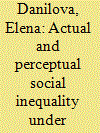

|
|
|
|
|
| Summary/Abstract |
This essay aims at comparing social inequality in Russia and China and how it is perceived by the urban population. The study from which evidence is drawn was conducted through a common methodology of representative surveys of the adult population in two big cities—Shanghai and St Petersburg. The investigation shows that although people in Russia and China have broadly egalitarian attitudes, there are significant differences in the way in which Russians and Chinese regard the current system of distribution. Attitudes to social inequality are much more complicated than a direct link with the objective social situation would suggest. Egalitarian attitudes are connected not only with the actual incomes but they are very powerfully affected by subjective assessments of the distributive system. The essay argues that behind a tendency towards the convergence of political regimes in the two countries at the present time there are different patterns of legitimacy based not only on economic achievement but also on the attitudes of the population, which the ruling elites use in seeking to strengthen their monopoly.
|
|
|
|
|
|
|
|
|
|
|
|
|
|
|
|
| 2 |
ID:
117369
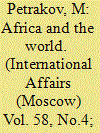

|
|
|
|
|
| Publication |
2012.
|
| Summary/Abstract |
FOR MANY DECADES, Africa was and still largely is a continent "full of problems." The problems of resolving existing conflicts and preventing new ones, and eradicating poverty, disease, social inequality, and illiteracy have always been especially acute in the African agenda. By no means all of them are resolved, or resolved to completion. But recent signs from the African South bear witness to an optimistic and ambitious vision for its future. RSA as the most economically developed country in Africa, projecting itself as a regional leader, generates political impulses aimed at strengthening Africa's overall position in the world, promoting regional integration and consolidating African identity as such.
|
|
|
|
|
|
|
|
|
|
|
|
|
|
|
|
| 3 |
ID:
102575
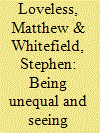

|
|
|
|
|
| Publication |
2011.
|
| Summary/Abstract |
Market economies inevitably generate social inequalities, of which the new democracies of Central and East European (CEE) societies have seen dramatic - though widely diverging - levels of growth. Do CEE citizens believe that inequality is excessive and, if so, why? And what is the connection between perceptions of social inequality and citizens' views of new markets and democracy? These questions are addressed using new data from mass surveys conducted in 2007 in 12 post-communist CEE states. Surprisingly weak links are found between social inequality perceptions and national-level measures of inequality as well economic, social and political conditions. Perceptions of social inequality are mainly driven by individual-level assessments of market and democratic performance, but not by market or democratic ideals.
|
|
|
|
|
|
|
|
|
|
|
|
|
|
|
|
| 4 |
ID:
166686
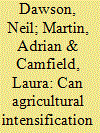

|
|
|
|
|
| Summary/Abstract |
Market-oriented agricultural intensification is a major development strategy, yet its alignment with sustainable development goals (SDGs) is unclear. We apply indicators for SDG 2 (eradicate hunger) regarding income, food production, food security and land tenure to recent intensifications in Rwanda and Laos to reveal their disaggregated impacts. We find while market-oriented intensification may generate poverty reduction, it also exacerbated marginalisation and poverty through various forms of land tenure insecurity. Ethnicity and gender were influential factors in Rwanda, and post-conflict resettlement policies in Laos. We discuss implications for development practice and selection of suitable indicators to reflect the ambition of the SDGs.
|
|
|
|
|
|
|
|
|
|
|
|
|
|
|
|
| 5 |
ID:
124990
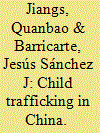

|
|
|
|
|
| Publication |
2013.
|
| Summary/Abstract |
Child trafficking is a serious problem in China. However, there has not been much research in this area. This article introduces the problem of child trafficking in China based on available data. First, the article examines the reasons for child trafficking followed by a summary description of the characteristics of the children who have been victims of trafficking. Next, the article analyzes the process of child trafficking and discusses the fate of the children involved. The article additionally provides a description of the various measures adopted by the Chinese government and NGOs (non-governmental organizations) to combat child trafficking and mentions the resistance to these measures. This article will hopefully draw the attention of the government, academia and the public to this issue.
|
|
|
|
|
|
|
|
|
|
|
|
|
|
|
|
| 6 |
ID:
156668
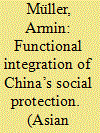

|
|
|
|
|
| Summary/Abstract |
Frictions between China’s institutional legacies of the planned economy and the new trends of marketization, urbanization, and migration have shaped institutional change in social protection. Focusing on health and pension insurance, this study identifies a gradual process of functional integration, which overcomes the frictions and facilitates a dualization of benefits.
|
|
|
|
|
|
|
|
|
|
|
|
|
|
|
|
| 7 |
ID:
187806
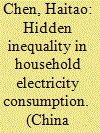

|
|
|
|
|
| Summary/Abstract |
Existing studies provide the estimates of climate change's impact on energy consumption, yet little attention has been paid to inequality based on fine-grained data. This paper takes advantage of the large-scale smart meter data to investigate the electricity consumption inequality and adaptation vulnerability issues. We find that there is a serious inequality underestimation issue arising from annual aggregate data. An average of 8.39% of the inequality is hidden every quarter, while the monthly hidden value reached 13.41% due to the seasonal offset effects. This inequality is the robust nonlinear inverted-N shaped relationship with temperature, which implies that the cold temperatures have a more severe impact on social inequality issues than hot. For cold days, one additional day in the range < 30 °F would result in an increase of 3.05% electricity consumption inequality. We also find households in high inequality cities have worse response ability when facing extreme temperature, indicating poor will suffer more from extreme temperature exposure. Policies to address climate-induced inequality issues would be more efficient if more attention be paid to the poor in cold winter.
|
|
|
|
|
|
|
|
|
|
|
|
|
|
|
|
| 8 |
ID:
097859
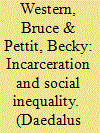

|
|
|
| 9 |
ID:
144162
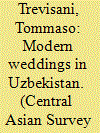

|
|
|
|
|
| Summary/Abstract |
Under the new conditions of independence, wedding ceremonies in Uzbekistan have increasingly diversified along growing social and economic divides. Recent state measures to curb ritual expenditures follow the furrow of a long tradition of criticism against ritual prodigality which, however, falls short of its self-set target of enforcing more ‘rational’ rituals. Based on fieldwork conducted in the Ferghana Valley, this paper sheds a new light on the controversy around ‘excessive ritual expenditures’ by discussing tensions in local practices arising from changing livelihoods and consumption patterns, on the one hand, and, on the other, from an ambivalent state policy that aims at containing ritual expenditures and social polarization, while also promoting an ideal of modern wedding that undermines the very aim of the policy.
|
|
|
|
|
|
|
|
|
|
|
|
|
|
|
|
| 10 |
ID:
146637
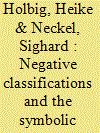

|
|
|
|
|
| Summary/Abstract |
This article explains a cultural sociological approach to research on social inequality. “Cultural sociological” means that we do not regard social inequality as resulting only from a distributive order of goods, income and positions, but also from an evaluative order created and reproduced by the actions of social groups. Concerning the topic of this thematic issue, this means that, from a sociological perspective, we see “weakness” not only as the social vulnerability of actors and groups resulting from a lack of material resources, education and power, but also as an attribution and assessment which can have a variety of social consequences. “Weakness” can compel others to help the weak and defend their interests. But if the weak are to be protected and empowered, they must be identified as “weak” in the first place, and this act of identification can have paradoxical consequences. As we demonstrate with evidence from East Asia, the social designation as “weak” can have many adverse effects for the weak groups themselves, because it blames them for their own weaknesses and publicly condemns, disparages, or stigmatizes them. Based on an analysis of the situation of victims of the Fukushima disaster in Japan and of rural migrants and their offspring living in Chinese metropoles, we show how social designations of weakness can produce negative classifications that signal disrespect to weak actors and limit their opportunities for action.
|
|
|
|
|
|
|
|
|
|
|
|
|
|
|
|
| 11 |
ID:
177539
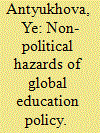

|
|
|
|
|
| Summary/Abstract |
THE WORLD has changed in the blink of an eye in 2020 after being struck by a new virus that triggered a pandemic, put people all over the planet under enormous stress and confronted many countries with social and economic problems needing urgent solution. One way or another, the COVID-19 pandemic has affected practically everyone in the world. There have been prompt large-scale suspensions of business in many economic sectors, including manufacturing, tourism, air transportation, hospitality, and entertainment. Other sectors have been adapting to the new reality. The latter sectors include education - the pandemic has affected more than two billion learners in 192 countries [12] and has forced schools and universities to go over to distance learning.
|
|
|
|
|
|
|
|
|
|
|
|
|
|
|
|
| 12 |
ID:
187170
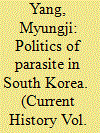

|
|
|
|
|
| Summary/Abstract |
Economic inequality has become pervasive in South Korea, fraying the social fabric and undermining the national image of a developmental paragon.
|
|
|
|
|
|
|
|
|
|
|
|
|
|
|
|
| 13 |
ID:
082700
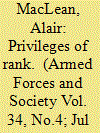

|
|
|
|
|
| Publication |
2008.
|
| Summary/Abstract |
This article examines the effects of peacetime cold war military service on the life course according to four potentially overlapping theories that state that military service (1) was a disruption, (2) was a positive turning point, (3) allowed veterans to accumulate advantage, and (4) was an agent of social reproduction. The article argues that the extent to which the effect of military service on veterans' lives corresponds with one or another of the preceding theories depends on historical shifts in three dimensions: conscription, conflict, and benefits. Military service during the peacetime draft era of the late 1950s had a neutral effect on the socioeconomic attainment of enlisted veterans. However, it had a positive effect on veterans who served as officers, which partly stemmed from status reproduction and selection. Yet net of pre-service and educational differences by rank, officers in this peacetime draft era were still able to accumulate advantage
|
|
|
|
|
|
|
|
|
|
|
|
|
|
|
|
| 14 |
ID:
124896
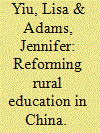

|
|
|
|
|
| Publication |
2013.
|
| Summary/Abstract |
The Chinese state's commitment to improve teaching quality in rural regions is a key component of national efforts to close the rural-urban education gap. In this paper, we investigate an understudied but critical dimension of quality teaching: teacher expectations. We employ longitudinal data gathered in Gansu Province in 2000 and 2007 to first examine whether teacher expectations for rural youth are conditioned by students' social origin and teacher background characteristics. Next, we determine the predictive accuracy of their expectations. Our results highlight the ways in which teacher expectations condition the sorting of rural children among different schooling tracks with distinct life trajectories. Significantly, teachers are more likely to hold lower expectations for students from disadvantaged backgrounds. In addition, non-local teachers hold lower expectations for rural children compared to local teachers. Finally, a low percentage of teachers expect students to enrol in post-compulsory vocational education. We consider the implications of these results for both educational policy and social inequality.
|
|
|
|
|
|
|
|
|
|
|
|
|
|
|
|
| 15 |
ID:
154417
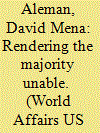

|
|
|
|
|
| Summary/Abstract |
The Founding Fathers conceived formal counter-majoritarian restrictions
aimed specifically to “render the majority unable”: to prevent the majority from
trampling on minorities in the U.S. democratic system. This article contends that
several such formal restrictions actually fail to protect contemporary minorities as the founders imagined they would. Indeed, counter-majority restrictions embedded
in the Electoral College, the Senate, and the judicial review may actually prohibit
such protection. Using a comparative politics approach, this article builds
on theoretical arguments and data that evaluate democratic functionality and
fairness based on level of social equality provisions as well as optimality of voter
participation. I find that certain counter-majoritarian procedures are empirically
linked to higher inequality levels across twenty-one advanced democracies. This
political suboptimality is reflected in a significant correlation between higher Gini
coefficients and majoritarian systems (with the United States in first place) in the
sample and also between lower scores and consensus democracies. I argue that
comparative analysis shows that some criticisms hitherto only leveled at the United
States are present in an entire family of systems—the majoritarian ones—which
begs significant critical questioning of the impact of institutional design on the
effectiveness of social policies and inclusive democratic procedures.
|
|
|
|
|
|
|
|
|
|
|
|
|
|
|
|
| 16 |
ID:
118427
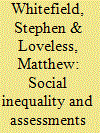

|
|
|
|
|
| Publication |
2013.
|
| Summary/Abstract |
Considerable comparative scholarly attention has been paid to various aspects of mass support for democracy and the market. However, despite strong theoretical suggestions of a linkage, little is known about the impact of social inequality on this support. We address this issue using evidence from mass surveys undertaken in 12 post-communist states in 2007, supplemented by country-level data about economic and political performance. Specifically, we investigate whether social inequality generates negative perceptions that democracy and the market will lead to social conflict and if it increases support for anti-democratic forms of governance. Notably, we find little link between citizens' expectations of social conflict and national-level indices of income inequality. However, we do find a link between perceptions of the extent of social inequality and expectations of market-generated-but not democracy-generated-conflict. Underscoring these positive and negative findings, perceptions of social inequality are also clearly consequential for support for 'strong-hand' economic government but not for anti-democratic leadership.
|
|
|
|
|
|
|
|
|
|
|
|
|
|
|
|
| 17 |
ID:
163432
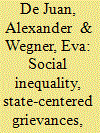

|
|
|
|
|
| Summary/Abstract |
What role does horizontal social inequality play for political protest in middle-income countries? We argue that public social service provision is an important driver of state perceptions. When a state fails to deliver services in an equitable manner, trust in institutions erodes and protest becomes more likely. We use a mixed methods design to investigate this argument in South Africa. First, we combine police event records with census data to estimate correlations between service inequality and protests. Second, we draw on an opinion survey with 27,000 respondents to investigate the suggested mechanism linking social inequality to protest through political attitudes. Third, we focus on qualitative protest accounts in two areas identified by a matching approach to assess the plausibility of our quantitative findings. Throughout these analyses, we document a robust association between horizontal social inequality and protest.
|
|
|
|
|
|
|
|
|
|
|
|
|
|
|
|
|
|
|
|
|